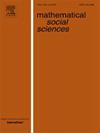论疫情时期的人力资本积累
IF 0.7
4区 经济学
Q4 ECONOMICS
引用次数: 0
摘要
在Goenka和Liu(2020)的精神下,我们研究了一个内生增长模型(la Lucas(1988)),其中传染病根据SIS动态传播并减缓人力资本积累。我们的模式在某些方面与他们的不同。我们只关注计划者的解决方案,在更普遍的偏好假设下,涵盖有界和无界增长情况。考虑到单一的资本商品,我们可以提供一个全球的分析和对过渡机制的深入理解。在收益减少的情况下,经济趋向于人力资本的固定存量,这种存量随着疫情的严重程度而减少。在无界生长的情况下,我们恢复了Goenka和Liu(2020)的主要结果:存在一条平衡生长路径,疾病严重程度对生长速度有负向影响。然而,在我们的模型中,在过渡期间,增长路径仅是渐近平衡的,并且被限制在指数带内。本文章由计算机程序翻译,如有差异,请以英文原文为准。
On human capital accumulation in times of epidemic
In the spirit of Goenka and Liu (2020), we study an endogenous growth model à la Lucas (1988) with an infectious disease spreading according to SIS dynamics and slowing human capital accumulation. Our model differs from theirs in some respects. We focus solely on the planner’s solution and cover both bounded and unbounded growth cases, under the assumption of more general preferences. Considering a single capital good allows us to provide a global analysis and in-depth understanding of the transition mechanisms. In the case of decreasing returns, the economy converges towards a stationary stock of human capital which decreases with the severity of the epidemic. In the case of unbounded growth, we recover the main results of Goenka and Liu (2020): the existence of a Balanced Growth Path with a negative impact of disease severity on growth rate. However, in our model, the growth path is only asymptotically balanced and confined within an exponential band during the transition.
求助全文
通过发布文献求助,成功后即可免费获取论文全文。
去求助
来源期刊

Mathematical Social Sciences
数学-数学跨学科应用
CiteScore
1.30
自引率
0.00%
发文量
55
审稿时长
59 days
期刊介绍:
The international, interdisciplinary journal Mathematical Social Sciences publishes original research articles, survey papers, short notes and book reviews. The journal emphasizes the unity of mathematical modelling in economics, psychology, political sciences, sociology and other social sciences.
Topics of particular interest include the fundamental aspects of choice, information, and preferences (decision science) and of interaction (game theory and economic theory), the measurement of utility, welfare and inequality, the formal theories of justice and implementation, voting rules, cooperative games, fair division, cost allocation, bargaining, matching, social networks, and evolutionary and other dynamics models.
Papers published by the journal are mathematically rigorous but no bounds, from above or from below, limits their technical level. All mathematical techniques may be used. The articles should be self-contained and readable by social scientists trained in mathematics.
 求助内容:
求助内容: 应助结果提醒方式:
应助结果提醒方式:


